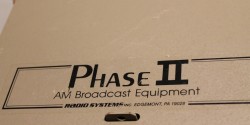Right now I’m making all of my final plans for next week’s College Broadcasters Inc. (CBI) conference in Seattle (October 23-25). I’ll be speaking on two panels and am also in the midst of scheduling visits to a bunch of radio stations in the area for my radio station field trip series. This will be my third CBI event and based on my past experience, it’s a great opportunity to meet and learn from other college radio enthusiasts. If you are attending, please stop by one of my panels or say “hello” in the halls. I’ll be speaking on Thursday, October 23rd at 4pm about college radio history and will be sharing insights from my college radio station field trips on Friday, October 24th at 3pm. More details on the conference can be found on the CBI website.
In other college radio news this week:
College Radio LPFMs Granted to Benedictine University and Manchester Community College
The FCC has picked up the pace on low power FM construction permit grants and more than 40 new stations got the go-ahead this week. Manchester Community College (Manchester, CT) and Benedictine University (Springfield, IL) were among this week’s new grants.
Manchester Community College plans to launch a student radio station which will be integrated with both internships and coursework, according to its application. The school has had a streaming radio station I.C.E. Internet Radio and last year launched over a very low power AM signal to the campus.
According to its application, Benedictine University plans to work closely with the local community in the programming of its station. Its application states, “The station’s programming will consist of local public affairs programming, local music, blues music and local sporting events. The studio will be made available to the community organizations who wish to produce radio programs, under the supervision of Benedictine University.”
Hampden-Sydney College Surrenders WWHS-FM License
In a letter dated September 25, Hampden-Sydney College (Hampden-Sydney, Virginia) returned its college radio license for WWHS-FM aka Tiger Radio to the FCC. In the letter, the school’s Vice President for Business Affairs and Finance W. Glenn Culley writes, “Hampden-Sydney College hereby surrenders the license to WWHS-FM. We have discontinued broadcasting.” The 92.1 FM license for the 10 watt class D radio station has been cancelled and the call sign deleted.
According to the WWHS Constitution, the station had its origins in the early 1970s when WHSV began on campus. The Constitution states, “WWHS-FM Tiger 92.1 (originally formed in 1972 as WHSV) has been instituted and organized to promote the benefits of educational radio and to provide entertainment for Hampden-Sydney College and Prince Edward County.”
The station’s complete history is hard to discern, but according to a student press report from 2010, the station had technical challenges in recent years.
Former WRAS Promotions Director Offers Advice to College Radio Stations
In advance of her appearance on a panel at the CMJ Music Marathon later this month, WRAS-FM‘s former Promotions Director shares some tips for college radio stations that may be facing challenging circumstances. In light of the Georgia State University station’s loss of student programming over daytime FM, Lauryn Christy talks about the importance of building relationships with a station’s local community. She explains how the Atlanta community came together to support WRAS after the university relegated student broadcasters to evening hours only. Christy states,
Our relationship with the community has become much more active, if that makes sense. I’d like to say that it has become more positive, but honestly I think we’ve always had a great relationship with the community. Atlanta, or at least the community who supports college radio and underground music, has always loved and appreciated WRAS. WRAS has been on air for 43 years, and it’s considered a staple of Atlanta culture. I think many people thought we’d always be here, at least in their lifetime, and now we can’t take that for granted. Our supporters have always been vocal, individually, but these recent changes have united them and it makes their voice seem that much stronger. People really come together when they see something they love being threatened.”
Another Top College Radio Station List – Did They Get it Right?
College Magazine penned a new list of the “Top 16 College Radio Stations.” As always, these lists are totally subjective and often pull from existing lists and award winners. I’ve noticed that stations that appear on the Princeton Review list of “Most Popular” college radio stations are typically mentioned, as are CMJ award-winning stations and mtvU Woodie winners. Some of my personal favorites never seem to appear, perhaps because they are too under the radar. Take a look at the list and let me know if you think they got it right. Which stations do you think are the best?
To keep up to date on college radio news, read College Radio Watch every Friday.



